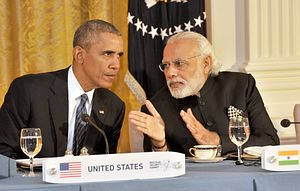Indian Prime Minister Narendra Modi recently embarked on an impressive five-nation tour that included countries as diverse as Afghanistan and Mexico. Modi’s international travels have rendered fruitful results, bolstering diplomatic ties and giving India more visibility in the international community. The six-day tour included visits to Afghanistan, Qatar, Switzerland, the United States, and Mexico, and while the visit to the first two countries reinforced India’s partnership with the Islamic world, the highlights of the trip concerned the other three nations. Most importantly, Modi obtained endorsement from the United States, Mexico, and Switzerland for India’s bid to enter the exclusive Nuclear Suppliers Group (NSG), a club of 48 countries that holds to established guidelines for trading nuclear-related technology.
But not all NSG countries are convinced of the benefits of India’s membership, among them Austria, New Zealand, South Africa and, most importantly, China, which considers being a signatory of the Treaty on the Non-Proliferation of Nuclear Weapons (NPT) – which India is not – a prerequisite for entering the club. The NSG works by consensus, so Chinese opposition to India’s accession — to be discussed in the Group’s Annual Plenary in Seoul on June 24 — would be a deal breaker. Convincing China will be a hard task, but there are good arguments for why the NSG should consider accepting India as a new member – and why China’s opposition would undermine Beijing’s quest to be recognized as a constructive member of the international community.
First, as already mentioned, China’s main argument for denying India’s entry is the fact that the country is not a signatory of the NPT. But as specified in the NSG’s procedures, being an NPT signatory is listed among the “factors taken into account for participation;” it is not a mandatory condition, and consequently this argument is weak and lacks validity. China also forgets the fact that France had been an NSG member for almost 20 years before signing the NPT in 1992, a precedent India’s supporters are willing to use. The group was formed to go beyond the NPT regime, so it would not be credible to deny India’s entry on that basis. China’s reluctance is therefore not technical, but entirely political. Moreover, other resistant countries are not opposed to India’s admission per se, but to the idea of an unprecedented concession to a U.S. partner instead of an institutionalized entrance process that should be equally applied to all applicants. The establishment of a clear and coherent admission procedure can address these concerns.
Furthermore, China’s opposition does not take into account that India is already engaged in several initiatives that control its nuclear-related material, making it a member whose adherence to NSG guidelines can be easily applied. As a condition for signing the U.S.-India Civil Nuclear Agreement in 2008, the NSG gave India a special waiver to trade nuclear material only if it agreed to have its nuclear facilities placed under the safeguards of the International Atomic Energy Agency (IAEA), which India did. India also harmonized its export control list to match the NSG Guidelines and it constantly reviews its own list to match with NSG updates. Therefore, even if not an official member, India is already a responsible nuclear power and an offstage adherent to the group’s requirements and rules.
Finally, and most importantly, India’s entry would strengthen the global nuclear non-proliferation framework. By accepting an emerging country and a new nuclear power, the NSG would be taking a step toward becoming a more inclusive, open, and democratic regime. It would also be a significant step, as the group was created in 1974 following India’s first nuclear test. Through the inclusion of a country it once disapproved of, the NSG is sending the message that it can reconsider a state’s position once it commits to the existing global rules. International institutions lack representation and remain in great part an exclusive club of occidental superpowers, putting aside emerging economies that can fully contribute to their development – as India can surely do as an active buyer and potential seller of nuclear technology. Likewise, India’s enormous population and fast-growing economy demands an increase in the country’s energy supply, which would be facilitated by becoming part of the NSG framework.
Giving India NSG membership will thus not undermine non-proliferation efforts. On the contrary, it will strengthen the credibility of the regime by accepting a growing and influential country into an important nuclear trade club. Engaging new actors in nuclear dialogues is a necessary step in a world where security and peace are discussed behind closed doors and with few actors in the room, leaving aside the opinions of nations like India. But regardless of the group’s final decision at the NSG plenary meeting, non-proliferation regimes can no longer deny India’s role as a nuclear power. Other NSG members should thus ensure that Beijing’s geopolitical considerations do not interfere with the NSG’s greater goals to promote non-proliferation and the safe use of nuclear technology.
Bhavani Castro ([email protected]) is fellow of Indian Studies at the Getulio Vargas Foundation in São Paulo, Brazil.

































